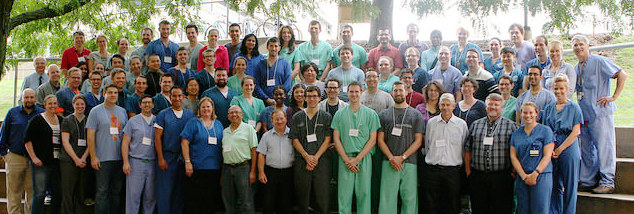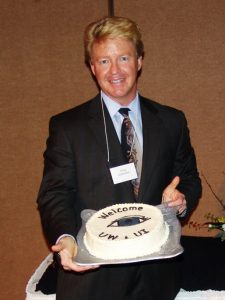
For the last 18 years, ophthalmology and veterinary ophthalmology residents from throughout the country have come to the Department of Ophthalmology and Visual Science to learn cataract surgery. At what may be the longest consistently running Phacoemulsification course in the country, attendees at the Department’s Multiphasic Phaco Course learn about all aspects of Phaco in a three-year, progressive course that includes both lectures and wet lab practice. The goal of this course is to prepare ophthalmology students and residents to begin their PGY 4 cataract rotations with a sound basis in medical knowledge and skills to maximize their cataract training experience. The University of Iowa and Medical College of Wisconsin are partner institutions, bringing their residents each year as well as providing lecture and lab teachers. Veterinary ophthalmology residents come from UW, UC Davis and a variety of other veterinary programs from around the US. In 2015, the University of Kansas began sending their PGY 3 medical ophthalmology residents and this year also provided faculty.
“Our course is different from all the other Phaco courses because we have three different, level appropriate sessions, covering the needs of beginning students and those at a more advanced level. Ophthalmology students learn about cataract surgery in the regular rotations during each year of their residency. The course gives our learners a one-on-one experience that will give them a jump start for the upcoming year’s training,” notes.
Phaco 2016 provided cataract training to 47 residents and medical students with the assistance of 31 volunteers who serve as faculty.
Background: Cataracts are the most common cause of vision loss in people over age 40 in the US and is the principal cause of blindness in the world. Phacoemulsification is the most common method used in the US to remove a cataract from a patient’s eye. The term refers to the removal of a cataract by first liquefying the affected lens with ultrasonic vibrations using a Phaco machine and then extracting it by suction.

Background
The Multiphasic Phaco course hosted each year by the Department of Ophthalmology and Visual Sciences, UW School of Medicine and Public Health is wholly supported with Educational grants from ALCON, AMO/Abbott, Zeiss Medical Optics, Precision Lens and Glaukos. Through the years we have also enjoyed technical support and guidance from industry professionals. One of those, Greg Anderson, who has worked with the Department’s program since 2007, passed away in December of 2014. “He was a very special person whose commitment to the course was very personal,’ says Andrew Thliveris, MD, PhD, vice-chair of Resident Education and Phaco program director.
As a way to remember Greg Anderson’s special commitment to teaching Phaco to residents, the program and residency directors from the Department and the University of Iowa created a memorial fund to perpetuate Greg’s legacy of teaching cataract surgery skills to residents. A. Tim Johnson, MD, who serves as the Phaco program director from Iowa was instrumental in obtaining an anchor gift from an anonymous source at Iowa. “This course is one of the highlights of our residency”, according to Dr. Johnson, “so we have a vested interest in ensuring we are able to not only continue but improve our Phaco course.”
As a culminating activity for lecture portion of the course, Thomas Oetting, MD, Iowa Residency director, gave the first Greg Anderson lecture – a case combination of case studies and tribute to Anderson’s teaching. “It was indeed an honor to present the first Anderson lecture,” said Dr. Oetting, “We miss his enthusiasm and commitment to training our residents throughout the years. Even during his lengthy fight with cancer, he was an invaluable resource for us.”